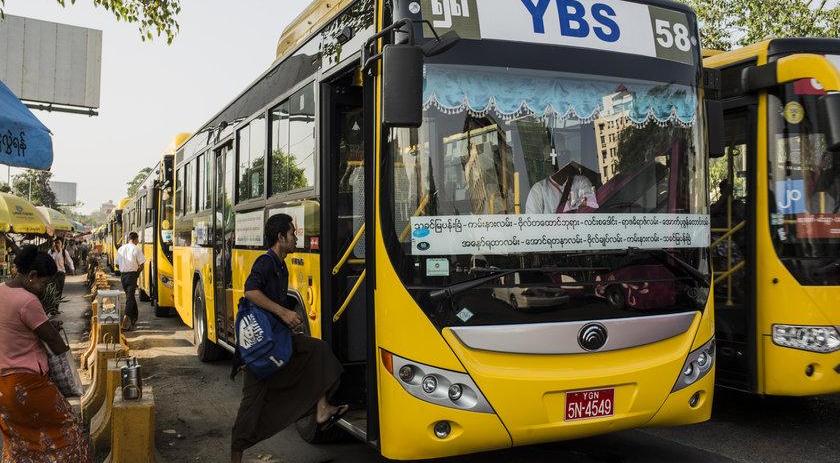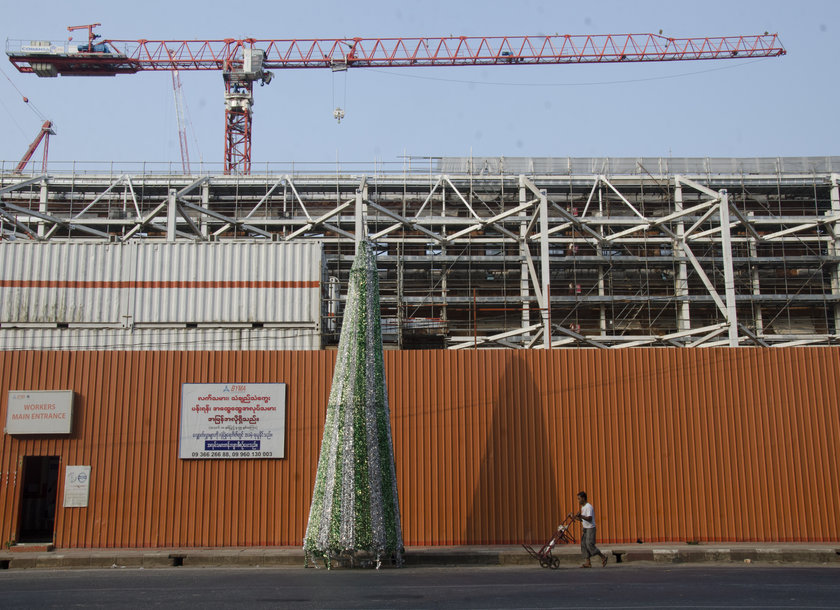
The Myanmar economy is expected to expand by 7.1 percent in fiscal 2019-20, up from 6.8pc in the previous fiscal year, buoyed by reform momentum, improving business sentiments, strong growth in garment and other manufacturing products, an expansion of tourism-related services and stronger fiscal spending, according to the ASEAN+3 Macroeconomic Research Office.
U Thant Sin Lwin, director-general of the Directorate of Investment and Company Administration and secretary of the Myanmar Investment Commission, is also expecting foreign direct investments to pick up and align with the government’s estimates for fiscal 2019-20. The country fell short of its $5.8 billion FDI target during fiscal 2018-19, with investors channelling just $4.1 billion into Myanmar.
The downside is the ongoing Rakhine crisis and lawsuit filed against Myanmar in the International Court of Justice by Gambia, which could tarnish the country’s image as an investment destination, businesses and economists said.
Myanmar is also expected to hold general elections in 2020, and many investors will wait and see how things unfold in the political economy before investing further in the country this year.
Nevertheless, here are five pockets of the economy with growth potential that investors should watch out for in the year 2020:
Tourism to improve
The industry should pick up this year with new government measures to lure tourists to Myanmar.
This month, the Ministry of Hotels and Tourism will introduce visas on arrival for tourists from the Czech Republic, Luxemburg, New Zealand, Hungary and Austria in a three-year trial programme.
It also plans to allow direct flights between Bagan, which was recently listed as a UNESCO World Heritage Site, and Siem Reap, Cambodia.
U Khin Aung Tun, vice-chair of the Myanmar Tourism Federation, said he is expecting more visitors from eastern countries this year. While Asian tourists typically spend less than their western counterparts, their presence is expected to give the budget travel industry a boost and benefit smaller hotels.
Myanmar had previously eased visa regulations for tourists from Japan, South Korea, Hong Kong and Macao in October 2018. It also permitted Chinese tourists to enter the country with arrival visas. Last year, it eased visa regulations for tourists from Germany, Russia, Spain, Italy, Switzerland and Australia.
There were over 1.5 million tourists in the first 10 months of 2019, including over 500,000 Chinese tourists. More than 370,000 tourists entered via border crossings.
Property’s year
Property investors are expecting prospects to improve after measures were taken to modernise and regulate the sector in the past two years. These include the forming of a committee at the beginning of 2019 to carry out condominium registering work, and enacting the rules to the 2016 Condominium Law in 2018.
A slew of new condominium at developments like Time City, Diamond Inya Palace, The Central, City Loft and 85 SOHO launched in Yangon in 2019, while other developments like Gonyi Residences and Emerald Bay are under construction.

Nevertheless, the number of condominium units in Myanmar is still much less that other countries.
“There are between 6000 and 8000 condos which are available for rent in Yangon, which is not enough for 100,000 foreigners. Rental demand will continue to outpace supply for the next 5-10 years,” said U Kyaw Sithu, Property Sales Director from Success Property Consultant Company.
With competition rising, property buyers can expect more attractive pricing and value in the market, making now a good time to invest in real estate, said U Kaung Thu Win, founder of Shwe Property.
Last September, the government also reduced taxes and stamp duties for property buyers with undisclosed income in fiscal 2019-20. Since then, transactions have been ticking up, said U Myo Myint, general secretary of the Myanmar Construction Entrepreneurs Association.
More interest in insurance
Insurance providers are preparing to introduce more options to the market in 2020 following the liberalisation of the sector last year. Only 1pc of the country's population has exposure to insurance, implying that there is large potential for growth.
“We are at the beginning of a fast-growing phase, with a surge of interest and enthusiasm being expressed at all levels of the market,” AIA Myanmar CEO Nhon Ly told The Myanmar Times.
“The market will become more competitive and people will start developing more awareness over insurance. This will translate into higher interest and demand and the rate of penetration for our industry will rise,” said U Myo Min Thu, managing director of AYA Myanmar Insurance.
U Aung Thura, CEO of Thura Swiss, said the coming together of local and foreign insurance providers will help the sector develop rapidly. “On the supply side, providers will be making more investments and increasing their capacity to provide more competitive products. This will develop quickly in the year,” he said.
It will take more time for demand to catch up, but this can be accelerated. “Demand is still weak due to the lack of awareness. The regulator will play a key role in driving the development of the insurance industry by allowing new products to enter the market to support its development.”
U Thaung Han, secretary of Myanmar Insurance Association, said "the main challenges of this sector had been business skills, knowledge and the lack of capability in producing our own products. But now, 80 pc of the issues can be considered solved as we are in business with other countries. So, growth in this sector is likely to intensify with support from the government.”
Digital payments to evolve
The digital payments sector in Myanmar is forecast to develop rapidly in 2020, with new payment technologies emerging and greater awareness from the public.
Already, banks and tech start-ups like Flymya and Inoveller are offering ticketing services, e-commerce systems and salary transfers online. Mobile services for the payment of school fees and taxes have also been launched.
This year, the Central Bank will launch MMQR, which enables digital payments using QR codes.
“Digital payment systems will improve further in 2020. Many mobile wallets will emerge. Contactless payments using cards and mobile phones will be offered, prompting the number of users to increase in the coming year," said U Zeyar Aung, head of Card and Merchant Services at CB Bank.
This year, Yangon Bus Services (YBS) is set to start using a digital card payment system on its buses. Once the YBS successfully implements the payment system, more will have a chance to get familiar with cashless technologies, banking experts said.
The rising number of mobile phone users - 24 million MPT users, 10 million Ooredoo users, 19 million Telenor users and seven million MyTel users – will also form a good client base for which digital payment services can be offered.
International payments providers like Visa, Master and UnionPay are also preparing to launch new products in the country, while tech providers like Grab and Facebook may also launch payment services on their applications this year, experts said.
Business on the bourse
Myanmar is set to allow direct foreign ownership of shares at the Yangon Stock Exchange (YSX) this year. The Securities and Exchange Commission of Myanmar, the regulator, announced last July that non-Myanmar individuals and locally-registered entities would be allowed to invest in listed shares of up to 35pc.
Analysts expect the move to spark interest mostly from Yangon-based retail investors, and to be followed by institutional investors when the bourse has more listings and a broader array of sectors represented by its listed equities.
No official timeline was given but analysts expect such trading to begin in the first half of this year.
Investor interest is already up. Last November, Philippine conglomerate Ayala Corporation announced its plan to take 20 percent stakes in two of Serge Pun’s listed companies – one of which is YSX-listed First Myanmar Investment (FMI) - for a total of $238 million. Ayala’s deal hence represents the first major foreign investment in a company listed on the bourse.
The Philippine conglomerate would provide a $82.5 million convertible loan to FMI allowing it to take an equity holding of up to 20pc at a price of K15,000 per share, the companies said at the time. FMI chief operating officer Tun Tun said the pair are “looking towards” converting the loan into equity “within the shortest practical time period.”
The YSX was incorporated with a paid-up capital of US$22.6 million in December 2014 and welcomed its first initial public offering in January 2018.












